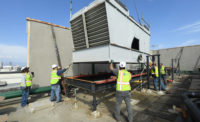In other parts of the Keystone State, specialty contractors see prospects in commercial construction. Master Locators, a subsurface investigations and utility discovery services firm in Glen Mills, Pa., expects more than 20% growth this year, with nearly all of its work coming from the commercial sector, says Kevin Sareyka, the company's manager of new business development. As a contractor that works primarily during projects' early phases, Sareyka says that there is no guarantee that all of the jobs Master Locators works on will be built. He adds, however, that by hiring a subsurface investigation firm, owners and developers are showing "a clear intention to build."
Although commercial is its primary market, Master Locators is also pursuing work related to oil and gas. Last year, the firm worked at the Eddystone Rail project, a Philadelphia-area oil-and-gas-shipment facility.
Other specialty firms see the improved outlook as an opportunity to grab market share. California-based Rosendin Electric established a Washington, D.C., office five years ago, aiming to use its resources and experience gained in other parts of the country to land large contracts. But the strategy didn't work, says Brian Brobst, Rosendin director of Eastern region preconstruction. Brobst says that when he joined Rosendin two years ago, the firm's regional office shifted focus to projects valued at less than $5 million. "That allowed us to build up our core bench with our field guys and to build strength in our management teams," he says. "We could gain credibility in the market to get out there and improve our name recognition."
After Reston, Va.-based Truland Group filed for bankruptcy in July, Rosendin suddenly saw significant opportunities open up. Rosendin took over several Truland jobs, including the 1.25-million-sq-ft Marriott Marquis Hotel project in Washington, which is led by Hensel Phelps.
"That gave us an additional opportunity to show contractors who we are and what we can do," Brobst says.
Brobst says Rosendin now needs to maintain momentum. To handle the influx of projects and position it for future work, Rosendin hired new employees, including some from Truland. "We had a strategic opportunity to pick up resources and grow this team stronger and faster than we originally projected," he says. "That work [from Truland] will dry up in about six months, so we need to keep the machine fed."
Brobst says Rosendin is now looking at $20-million to $30-million projects in addition to smaller jobs. "We think there needs to be another strong electrical contractor to take on these larger projects," he says.
In light of a more favorable market, specialty contractors are looking to improve contract terms. Casey says he sees D.C.-area firms being more selective about which projects to bid on. That has led to short bid lists on projects. As a result, he expects general contractors to be more willing to negotiate on terms.
Casey says ASA Metro Washington is also working with D.C. government officials to push for prompt payment of contractors. "The current process is very slow, and we're working with them to improve it," he says.
Still, Thrappas says he sees lingering payment issues in the Baltimore area. "We have a problem with GCs asking for early payment discounts of 2% to 5%," he says. "If you take the discount, you may get paid in 30 days. If not, you may not get paid for months."
With increased use of public-private partnerships to deliver projects, ASA is looking at legislation to provide payment protections on PPP projects in several states in the region, says Colette Nelson, ASA chief advocacy officer. Nelson also notes that D.C. and Virginia are pushing legislation to address employee misclassification and hike penalties for wage-and-hour violations.








Post a comment to this article
Report Abusive Comment